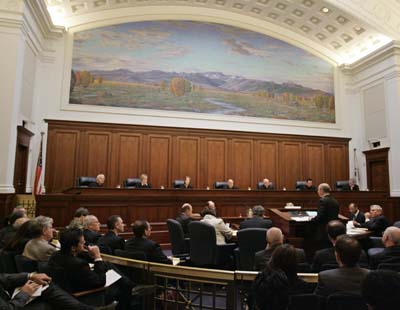
By LISA LEFF and PAUL ELIAS
SAN FRANCISCO
As thousands demonstrated outside Thursday, California Supreme Court justices weighed whether the electorate’s decision to ban same-sex marriage was a denial of fundamental rights or within what one justice called the people’s “very broad powers” to amend the state constitution.
Gay rights advocates are urging the court to overturn the ban, approved in November as Proposition 8, arguing that it represents such a sweeping change it constitutes a constitutional revision as opposed to an amendment. The distinction would have required the ban’s backers to obtain approval from two-thirds of both houses of the California Legislature before submitting it to voters.
Proposition 8’s sponsors, represented in court by former Whitewater prosecutor Kenneth Starr, argue that the ballot initiative was approved correctly, and say it would be a miscarriage of justice for the court to overturn the results of a fair election.
The ballot initiative, which passed with 52 percent of the vote, effectively reversed last year’s 4-3 Supreme Court decision that legalized gay marriage. The court found that denying same-sex couples the right to wed was an unconstitutional civil rights violation.
California voters first enacted a ban on gay marriage in 2000.
Minutes into Thursday’s proceedings, the justices peppered lawyer Shannon Minter, who represents same-sex couples, with tough questions over how the 14 words of Proposition 8 represent a revision of the state’s constitution or a denial of fundamental rights.
Chief Justice Ron George asked what rights were lost other than being able to label their union as a marriage.
“Relegating same-sex couples to domestic partnership does not provide them with everything but a word,” Minter said. “It puts those couples in a second-class status.”
The Supreme Court is hearing arguments on three points: Is Proposition 8 invalid because it constitutes a revision of, rather than an amendment to, the California Constitution? Does it violate the separation of powers doctrine under the California Constitution? And, if it’s constitutional, does it affect the 18,000 marriages of same-sex couples performed in the 4½ months before it passed?
Justice Joyce Kennard said the court was being asked to decide between two rights – the right of the people to change the constitution and the right to marry.
“And what I’m picking up from the oral argument in this case is this court should willy-nilly disregard the will of the people,” she said.
She said voters had successfully overturned a Supreme Court ruling that the death penalty represented cruel and unusual punishment. The court later upheld that voter-approved initiative to install capital punishment and 13 inmates have been executed in California since 1978.
“Life is, at least in my view, a fundamental right,” Kennard said.
Raymond Marshall, an attorney for minority groups such as the NAACP, replied that the death penalty applies to all Californians.
“I think what you are overlooking is the very broad powers of the people to amend the constitution,” Kennard told Marshall as he finished up his arguments. The groups Marshall represents argue that if voters can take the right to marry away from gays, they could also deny other minorities their rights.
Countering the pro-gay marriage arguments, Starr said that Proposition 8 sought to restore the traditional definition of marriage and deny recognition of same-sex marriage. Starr said that gay couples still enjoy the full “panoply of rights” of domestic partners.
He also argued that California voters have an “inalienable right” to amend the constitution and that taking away rights through the initiative process is not a revision that alters the structure of government.
“There must be far-reaching change in the basic structure of government,” said Starr, adding that there’s a long line of previous Supreme Court decisions supporting his position.
Justice Kathryn Werdegar countered that nothing in those decisions stated that something “must” alter the structure of government to qualify as a “revision.”
“This is a new day,” she said.
Starr said he and Werdegar would have to “agree to disagree” and that “rights are important but they don’t go to structure.”
On the discussion of whether the earlier marriages are valid, Justice Carlos Moreno noted Proposition 8 states that marriage “is” limited to a man and a woman.
“I know people can argue over what ‘is’ means,” Moreno said.
“The language has to be unequivocal,” replied San Francisco deputy city attorney Therese Stewart, arguing to overturn Proposition 8. “I don’t think that’s the case here.”
At least three justices appeared skeptical that proposition could be applied retroactively.
George suggested the validity of the earlier marriages was purposely omitted from Proposition 8 as a campaign strategy to increase the likelihood of its passage.
Starr, former Pepperdine law school dean, said the intent of Proposition 8 was to invalidate those marriages. Starr noted that Proposition 8 was drafted before the high court legalized gay marriage on May 15.
The Supreme Court’s seven justices have 90 days after the oral arguments in which to issue a ruling.
Outside, gay marriage rights supporters as well as opponents held signs lobbying the justices to take their side. Thousands also watched the proceedings on a big screen television.
Dana Tibbits, who drove 400 miles from her home in Ventura County to join the crowd of Proposition 8 supporters, said she there for the “approximately 7 million voters whose voices need to be heard.”
“I’m concerned about the justices, the weight of our vote and the weight of our decision,” Tibbits said.
Gay marriage supporter Chris Bospuz, 23, said after the hearing: “I was pretty disheartened at the beginning, but I’m optimistic,” he said. “It’s a civil right and they can’t just strip away civil rights.”








